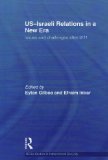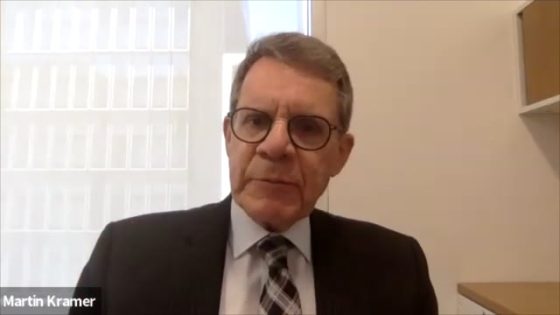US-Israeli relations display one of the most complex set of bonds between any two countries in the post-World War II world, as they comprise not only diplomatic and economic ties, but also religious, military, strategic and political relations as well. After a period of coolness in the Truman (1948-1953) and Eisenhower(1953-1961) Administrations, relations improved during the Presidencies of John F. Kennedy(1961-63) and Lyndon B. Johnson(1963-1969) but did not begin to develop the extensive ties visible today until the Nixon Administration(1969-1974), particularly in the military/strategic sector, which occurred after Israel aided the United States in supporting American ally Jordan when Soviet ally Syria invaded Jordan in September 1970. Then, following 9/11 when both the United States and Israel were confronting Islamic-motivated terrorism ( the US from Al-Qaeda and the Taliban, and Israel from Hamas and Hizbollah) relations deepened further. This book, ably edited by Eytan Gilboa and Efraim Inbar, discusses the different aspects of the relationship, from security ties to the roles of AIPAC and American Evangelical Christians in promoting US-Israeli relations.
The central unifying theme in the book is the disdain for the academic work on the Middle East by US professors John Mearsheimer and Steven Walt, first as a working paper and then as a book with the title, THE ISRAELI LOBBY AND US FOREIGN POLICY. Walt and Mearsheimer, argue that Israel and the pro-Israel lobby in the United States have undue influence over US foreign policy in the Middle East and were the critical factor in the US decision to go to war against Iraq in 2003. I share the perspective of the authors of the Gilboa/Inbar book that the work of Walt and Mearsheimer reflected “shoddy scholarship”(p.86). Indeed, I would carry their argument one step further. In my view, the book by Walt and Mearsheimer is not just an example of “shoddy scholarship”, it is also an example of what I would call “advocacy scholarship”,. as the two US professors, building on their fallacious understanding of the dynamics of the US entry into the Iraq war in 2003, seem to have been trying to prevent the US, under alleged Israeli pressure, from going to war against Iran as well.
The best refutation of the Walt-Mearsheimer thesis is found in the excellent chapter by Dov Waxman, “A War for Israel?:Israel and the War in Iraq”. Waxman refutes the Walt-Mearsheimer thesis point by point, and notes(p.127) that to argue “that Israel had such immense leverage over the United States that it could get the US to commit its military power to fight a war for Israel’s sake…grossly exaggerates Israel’s influence on American decision-making”. Waxman goes on to note that the primary influence of the pro-Israel lobby in the US is on the US Congress, not the US President, who is primarily responsible for US foreign policy decision-making, and Waxman cites—as do other authors in the volume—the numerous clashes between Israel and US Presidents over Middle Eastern issues, whether over arms sales to Arab Countries, Israeli settlement policy on the West Bank, or President Ronald Reagan’s recognition of the PLO. Waxman also convincingly concludes,(p.128) “ However ‘special’ the relationship between them, Israel is fundamentally a client state, and is in no position to convince the US to fight a war on its behalf””. Further reinforcing Waxman’s argument are the recently released memoirs of former US President George Bush, DECISION POINTS, and former US Secretary of Defense Donald Rumsfeld, KNOWN AND UNKNOWN, that barely mention Israel in their descriptions of US thinking about going to war against Iraq in 2003. In another chapter highly critical of the Walt-Mearsheimer thesis, Michell Bard, in his chapter “AIPAC and USA Middle East Policy” analyzes the strengths and weaknesses of the leading pro-Israel lobby in the United States. It is a very well argued chapter, and Bard carefully describes the link between AIPAC and the US Congress. Where I would differ with him, however, is in his assertion that the State Department is dominated by “Arabists” (p.78) If this were the case in the period from the mid-1940’s to mid-1960’s, it is no longer true.
One of the most useful contributions in the book for students of US-Israeli relations is Efraim Inbar’s analysis of the strategic relations between the two countries in his chapter, “US-Israel Relations in the Post-Cold War Era: The View From Jerusalem”. Inbar begins his chapter by noting that on a number of occasions the US has pressured Israel on security issues (pp.35-36) such as not responding to Iraqi missile attacks on Israeli population centers during the first Gulf War in 1991 -a development, which as Inbar correctly notes, undermined Israeli deterrence– as well as by preventing the sale of an AWACS plane to China in 2000. Inbar then describes in great detail the development of security relations between the US and Israel. These include the establishment of a joint politico-military group in 1983, the designation of Israel as a “Major Non-NATO Ally” in 1987, and the extensive exchange of intelligence, especially since 9/11(pp.43-44) He also discusses the increasing cooperation between the US and Israeli defense industries, and Israel’s investment in the new American F-35 joint strike aircraft. Inbar also explains why the US and Israel have never signed a defense treaty(p.46), “ While Washington did not want to be burdened by a commitment to a country formally in a state of war with its neighbors, Jerusalem preferred to maintain its freedom of action and its nuclear deterrent.” Inbar concludes, however, that such a treaty could yet be signed, “ if Israel reaches an agreement with Syria involving the evacuation of the strategic Golan Heights or if Iran becomes a nuclear power” (p.46).
Emanuel Ottolenghi wrote one of the most perceptive chapters in the book, “Transatlantic Relations and the Middle East”. Ottolenghi convincingly demonstrates that a European cultural anti-Americanism long predated the Presidency of George W. Bush (p.179), and this underlies much of European elite views of the United States. Consequently, given the close US-Israeli relationship, Europeans have become very anti-Israel as well. He gives a number of examples of theis phenomenon, including the unquestioned acceptance by the European Left of the wildly inflated claims of Palestinian dead during Israel’s invasion of Jenin in 2002 to stamp out terrorism there (pp. 83-84) as well as its unquestioned acceptance of the Walt-Mearsheimer thesis on undue Israeli influence on US foreign policy. Ottolenghi concludes (p.190) that “anti-Americanism and anti-Zionism are closely linked—two faces of the same coin”.
Other solid contributions to the edited volume include Eytan Gilboa’s study of the public dimension of US-Israeli relations, Ira Sheskin’s analysis of the implications for US-Israeli relations of American Jewish demography, Jonathan Rynhold’s study of conflict management and conflict resolution in US policy toward the Arab-Israeli Conflict, Cherian Samuel’s examination of the triangular relationship among the US, Israel and India, and and Amikam Nachmani’s evaluation of a similar triangular relationship-the one among the US,Turkey and Israel. Nachmani’s study is a useful historical analysis, although both Turkish-Israeli and Turkish-American relations have sharply deteriorated since Nachmani finished his chapter in 2008.
While the vast majority of the chapters of the book are well-worth reading, two are weaker. The theoretical chapter by Benjamin Miller, while reflecting a good example of International relations theorizing, is a bit too theoretical and tends to be divorced from the reality on the ground, as in his evaluation of Russian policy during the first Gulf war (p.17). The one problematic chapter in the volume is Paul Charles Merkley’s analysis of American Christian support for Israel. While he correctly asserts that the centerpiece of Evangelical support for Israel derives from the Biblical verse,[ Genesis 12:1-5,] “Those who bless you(Abraham and his descendants, I will bless…”, Merkley’s analsis is written from such a right-wing perspective, that his chapter loses credibility. Thus he asserts that US university departments such as sociology, anthropology and comparative religion reflect “dogmatic schemes of thought”(p.117), and that The Fundamentals of the Christian Faith, which was originally written to refute Darwinism, reflected the highest quality of scholarship of the time (p..116).
These two problematic chapters notwithstanding, US-Israeli Relations in the New Era is a very solid collection of essays and will serve as a useful reference for anyone interested in US-Israeli relations.
Robert O. Freedman, Visiting Professor,
Johns Hopkins University





